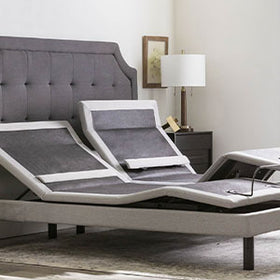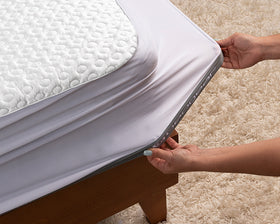888-996-9890

Sleeping Too Hot?
Can Room Temperature Really Affect Your Quality of Sleep?
The short answer to that is yes. Sleeping too hot or too cold can affect the quality of your sleep in several ways.
Room temperature is a part of your ideal sleep environment, and when you’re too hot or cold it can interrupt your sleep patterns and leave you feeling exhausted the next morning. Even if you’re trying to be money conscious by using the A/C as little as possible, you’ll suffer for it in the long run and end up spending all that saved money on coffee to keep you awake.
How Air Temperature Affects Sleep
Sleep experts the world over have stated time and again that the temperature of your bedroom and how comfortable you feel affects how well and how long you sleep.
But why?
According to H. Craig Heller, Ph.D., professor of biology at Stanford University, who wrote a chapter on temperature and sleep, when you go to sleep, the temperature your brain tries to maintain for your body goes down. The body struggles to achieve this temperature when the air around it is overly hot or cold.
We need that mild drop in body temperature to help induce sleep. What’s more, Ralph Downey III, Ph.D., chief of sleep medicine at Loma Linda University, has stated that that temperature needs to be maintained all night as well. If the air temp goes up in the middle of the night, you’re much more likely to wake up, wreaking havoc on your sleep cycle.
He also states the comfort level of your bedroom temperature also affects the quality of REM sleep, when you’re dreaming. There’s no doubt about it if you’re sleeping in a room far colder or hotter than that range it can cause restless nights and affect sleep quality, meaning you’re exhausted during the day.
What’s the Best Temperature for Sleeping?
Recommending a specific range can be challenging according to Downey and Heller. One person can find 60 degrees just right while another will be freezing. A typical recommendation is to keep the room between 60 and 72 degrees Fahrenheit, but Heller advises setting the temperature to whatever the sleeper finds best as long as it’s cooler.
Creating the Perfect Sleep Environment
So, for most people, the recommended bedroom temperature of 60 to 72℉ will induce optimal sleep. Personally, I set the temp to 74 which I like because I’m not overly warm and can still lay a thin blanket on top of me.
As you know when you’re trying to fall asleep your body temperature lowers, helping it do so will mean less time lying awake in bed. Experiment with room temps for a bit to see what one works best for you, and any partner that you’re sharing your bed with.
Another idea to keep in mind when creating the perfect sleeping space is that your room should be your cave. Keep it quiet, cool, and dark. Bats sleep in caves and get a whopping 16 hours a day. Room darkening curtains are a worthwhile investment, and you should try to keep the late night light to a minimum. Watching TV or reading too late with the light on can interfere with your body’s ability to produce melatonin because it needs darkness to do so.
If you’re still having trouble, you can try putting a hot water bottle at your feet or wearing socks. This assists to dilate your blood vessels quicker and get your internal thermostat to a better setting.
If you’re setting the temp for a baby or toddler, try for a temp closer to the 65-72 degree mark. Just make sure to keep the crib or bed isn’t right in front of a running fan or open window so that the temperature stays consistent.
More Helpful Tricks
- Memory foam is a wonderful sleeping surface because it conforms to your body, but you might get hot. If so, try out a cooling cover or check out the breeze° line of mattresses from Tempur-Pedic that can help you sleep up to 8 degrees cooler.
- Don’t do anything too stimulating before bed. It can take longer for your brain to power off and affect how quickly you fall asleep.
- Get regular exercise. I’m not saying run a marathon. I just mean be active in a way that gets your heart pumping and helps you feel tired, that uses up your energy.
- Get some sun during the day, and limit light, especially blue light from devices, at night. This helps to ensure your body is responding to and maintaining natural circadian rhythms, which just means successfully understanding day and night.
- Don’t drink caffeine late in the day.
- Don’t take overly long naps, unless you are sick or really need the extra sleep.
- Go to bed and wake up at the same time every day, even weekends.
- Find the right noise balance whether that’s completely quiet or you use a sleep track or white noise machine. I usually listen to thunderstorms.
- Don’t eat late at night or drink late at night.
- Try to include a relaxation routine before bed, such as meditating, taking a warm bath or shower, utilizing deep breathing techniques, reading, or listening to relaxing music. I’m personally a huge fan of sleep meditations, and they can even help with anxiety when you’re trying to sleep.
- If you are anxious or stressed, or are dealing with mental illness, try a weighted blanket. They can help you to feel grounded and cut down on external stimulus.
If you’re looking to upgrade your sleeping experience, don’t forget about your mattress. It’s a huge investment. After all, you’ll be spending half your life there. Make sure you get something you’ll love and provides the support, and temperature regulation, you need. When you need help, just give us a call at (866) 572-5738 or email us at info@bedplanet.com. You can also visit our mattress store in Las Vegas if you want to try out a mattress before you buy!





